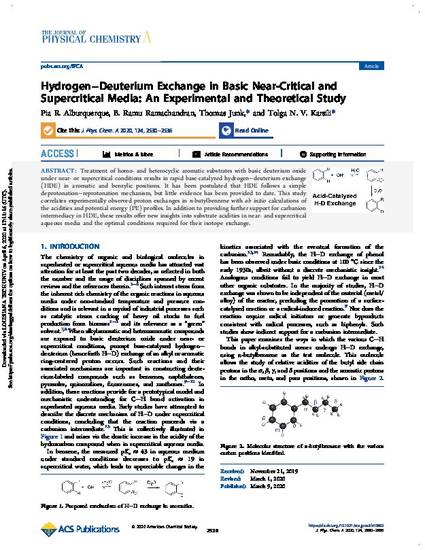
Article
Hydrogen-Deuterium Exchange in Basic Near-Critical and Supercritical Media: An Experimental and Theoretical study
Journal of Physical Chemistry A
(2020)
Abstract
Treatment of homo- and heterocyclic aromatic substrates with basic deuterium oxide under near- or super- critical conditions results in rapid base-catalyzed hydrogen-deuterium exchange (HDE) in aromatic and benzylic positions. It has been postulated that HDE follows a simple deprotonation-reprotonation mechanism, but little evidence has been provided to date. This study correlates experimentally observed proton exchange rates in n-butylbenzene with ab initio calculations of the acidities and potential energy (PE) profiles. In addition to providing further support for carbanion intermediacy in HDE, these results offer new insights into substrate acidities in near- and super- critical aqueous media and the optimal conditions required for their isotope exchange.
Keywords
- hydrogen-deuterium exchange,
- supercritical water,
- pKa calculations,
- weak acids
Disciplines
Publication Date
Spring March 9, 2020
DOI
10.1021/acs.jpca.9b10892
Citation Information
Pia R Albuquerque, B. R. Ramachandran, Thomas Junk and Tolga N. V. Karsili. "Hydrogen-Deuterium Exchange in Basic Near-Critical and Supercritical Media: An Experimental and Theoretical study" Journal of Physical Chemistry A Vol. 124 (2020) p. 2530 - 2536 Available at: http://works.bepress.com/ramu-ramachandran/10/
